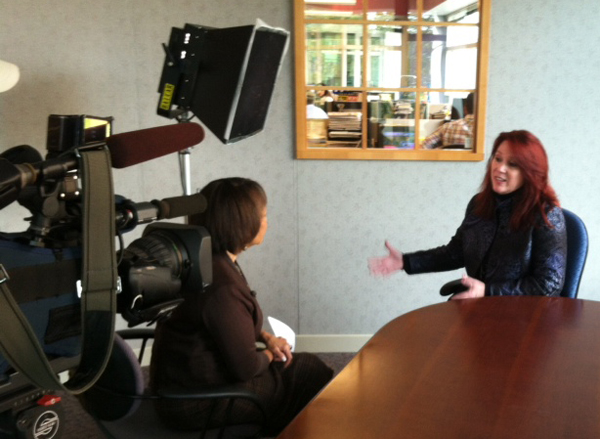Wyman & Ferguson: Don’t get scammed when giving to charity
KOMO-TV’s Connie Thompson interviews Secretary Wyman.
With the holidays approaching, commercial fundraisers will ask for donations they say will go to charities. But Secretary of State Kim Wyman and Attorney General Bob Ferguson are urging Washingtonians to think before they give.
The two statewide officials spent Thursday morning doing TV and radio interviews to share tips — and warnings — on how to give wisely during the holiday season and beyond, and how to beware of unscrupulous fundraising.
Said Wyman:
“Washingtonians are very generous and big-hearted. As we were reminded after the Oso tragedy last spring and the wildfires in north-central Washington last summer, many of us give money to help those in need, whether it’s here or around the world. Unfortunately, scammers can victimize people if donors aren’t careful and do their homework before they give. We want to help people avoid being ripped off.”
Added Ferguson:
“Charity scams increase during the holidays. It is important to exercise caution and make sure your money helps those who truly need it.”
The Secretary of State’s Charities Program released the latest figures in its Commercial Fundraiser Activity Report. The report can be seen here. Some takeaways:
- Charities that used commercial fundraisers received an average of 48 percent of contributions, slightly higher than the 46 percent found in the 2012 and 2013 reports but lower than 56 percent reported in 2011.
- Eight fundraisers returned more than 80 percent of total contributions to their charity clients, but 22 returned less than 20 percent of the funds raised to their clients.
- More than $572 million was raised in Washington and elsewhere by the 129 million commercial fundraisers included in the report, about $50 million more than the amount for the period ending last December.
- There currently are about 10,300 charities registered in Washington. Of those, 632 report using paid fundraising services.
Here is a link showing the report’s history.
The officials advise consumers to contact potential charities directly. For more information on finding charities, visit the SOS charity lookup here. You can also contact the OSOS Charities Hotline at 1-800-332-4483. If a consumer believes they have been scammed, contact the AGO at 1-800-551-4636.
Here are ways to avoid getting scammed by those seeking donations:
• Ask the caller to send written information about the organization.
• Beware if the caller offers to send a courier to collect your donation immediately.
• Don’t give in to high-pressure solicitations that demand an instant commitment. Just hang up!
• If you decide to donate, write a check and make it payable to the charity.
• Never send cash or give your credit card or bank account number.
• Don’t be fooled by a name. Some organizations use similar-sounding names, or names that closely resemble those of respected, well-established charities. Be sure to check them out.
